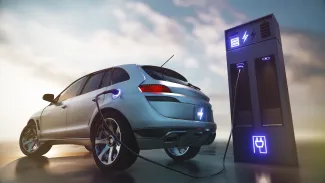
EarthTalk – Are the Chinese way ahead of other EV automakers?
©
Dear EarthTalk:
Are the Chinese actually way ahead of U.S., European and Japanese automakers regarding EVs? And are we ever going to see Chinese cars on American roads?
P.L., via email
China has quickly become a dominant force in the global electric vehicle (EV) market, surpassing car makers in the U.S., Europe and Japan. Western car companies used to be the leaders in innovation, but Chinese car makers have surged ahead recently, producing affordable, high-tech EVs at record speed. This has raised concerns in the U.S. about whether Chinese automakers will soon enter the American market and how that could affect domestic car companies. With growing competition and trade tensions, the question remains: Are Chinese EVs really ahead? And will they ever make it onto American roads?

One of the main factors that brings China’s EV success is robust government support. For years, China has offered substantial subsidies, tax incentives and infrastructure investments to enhance EV sales and manufacturing. China also has control over a large part of the worldwide battery supply chain, which provides its car makers an edge regard to cost and access to crucial components. Firms such as BYD, Nio and XPeng have emerged as global leaders, providing EVs that are not only less expensive than Western options, but also equipped with advanced technology. These elements enable China to sell its EVs globally, surpassing American and European car makers in both production scale and cost-effectiveness.
Although they’ve achieved global success. Chinese EVs still face hurdles to enter the U.S. market. High tariffs increase the cost of export, and persistent geopolitical tensions between the U.S. and China further complicates trade. Concerns also exist about cybersecurity and intellectual property. As some lawmakers suggest, vehicles made in China may pose a security threat due to their sophisticated data collection and connectivity capabilities. Additionally, American car makers and lawmakers have opposed permitting Chinese competition, worrying it might undermine local EV manufacturing and lead to job reductions.
Because of these barriers, some Chinese carmakers are looking at different ways to enter the market. One possible strategy is making EVs in Mexico, whereby they’d benefit from the USMCA trade agreement and potentially avoid some tariffs. Others might partner with Western brands to supply batteries or technology, which would let them compete in a more indirect way. Many American EVs already have Chinese components, so even without full vehicle imports, China still plays a big role in the U.S. industry.
Competition between China and Western automakers is likely to get more intense. U.S. and European governments are giving more subsidies for domestic EV production, trying to close the gap. But if China keeps expanding fast, it may be really hard for Western automakers to catch up. Whether or not Chinese EVs show up in American dealerships, their influence on the global car industry can’t be denied.
CONTACTS
- How China’s EV Industry Gained an Edge Over the West – World Economic Forum weforum.org/stories/2024/06/China-electric-vehicle-advantage/.
EarthTalk® is produced by Roddy Scheer & Doug Moss for the 501(c)3 nonprofit EarthTalk. See more athttps://emagazine.com. To donate, visit https://earthtalk.org. Send questions to: question@earthtalk.org.

















